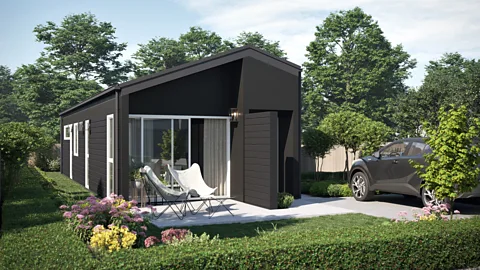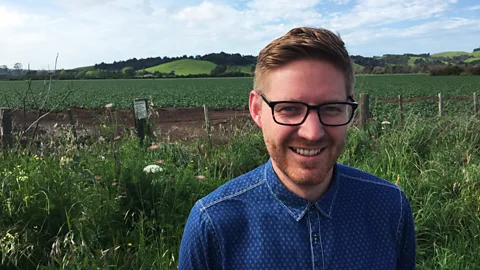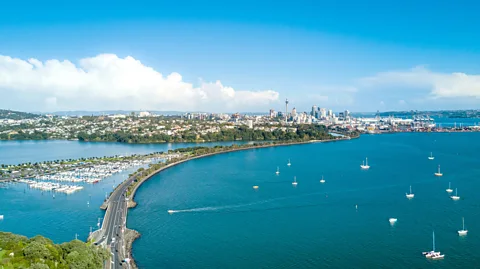Who should be able to afford 'affordable' housing?
 New Zealand Ministry of Housing and Urban Development
New Zealand Ministry of Housing and Urban DevelopmentA new housing programme in New Zealand is meant to help young people priced out of buying homes. But KiwiBuild might be too expensive for the very people many think it should help.
After several attempts to buy his first home, Jason Cooper had given up. He’d put down what he thought were “reasonable” offers on modest houses in New Zealand’s capital, Wellington, only to be outbid by what he said were shocking margins.
He took a job in Auckland, but then found himself in the centre of the country’s most bloated property market, where the average house price is more than one million New Zealand dollars ($678,000). Cooper consigned himself to a life of renting.
“I am still shocked that, at the age of 33, in a professional job as a lawyer, I can't afford a house,” he says.
It is a common refrain in New Zealand, where only a quarter of people aged 40 and below own their own homes – compared to half in 1991. The decline of millennial homeownership is a global trend, and commentators have been quick to blame millennials’ different financial priorities – such as frivolous spending on avocado toast – for their lower rates of property ownership.
But the reality is more complicated, including in New Zealand, where a chronic undersupply of homes has driven housing unaffordability to rank among the highest in the developed world.
 Jason Cooper
Jason CooperIf you build it, they will buy
This month a group of excited first-time home-buyers moved into 18 new houses in Auckland. Unlike Cooper, they had been able to secure properties for purchase – but had done so on the back of a government scheme.
The programme, KiwiBuild, gave them the chance to buy property for a fixed sum, and shut out investors who drive up prices out of reach. Until they had heard their names pulled from a ballot of hopefuls, many of these young professionals had abandoned hope of footing it in the million-dollar property market of New Zealand’s largest city.
KiwiBuild has sparked a debate, however, which has resonated globally. Leaders of some of the world’s least affordable cities, including Sydney, Hong Kong and London, have wrestled with the meaning of ‘affordable’ housing, and what a government’s housing priorities should be: finding homes for its poorest citizens, or catering to low-middle income earners who can afford to rent – but not to buy.
Facing high rates of homelessness, unaffordable rents and long waiting lists for public housing, New Zealand’s centre-left government has, in the year since it took office, set out an ambitious agenda to tackle all of the country’s housing woes nearly simultaneously.
 Getty Images
Getty ImagesThe tall order is partly why the KiwiBuild scheme – which has included a government pledge for 100,000 affordable new homes for first-time buyers in the next decade – has already proved controversial. The government’s political opponents, and critical pundits balked when the first recipients of the fixed-price, unsubsidised homes revealed themselves to be a soon-to-graduate medical student and a marketing manager. Critics argued that the houses, and the wide range of incomes allowed to apply for them, showed KiwiBuild was little more than middle-class welfare.
Fixed or broken?
State interventions to put first-time home ownership within the reach of low-to-middle income buyers are not unusual. Britain’s Help to Buy programme, for example, allows interest-free government loans to partly cover the cost of a property. In the United States, subsidy programmes for first-home buyers are also common.
Subsidy programmes often face criticism, however, that they drive up prices and still only benefit those who can almost afford a home, although a report produced for this year’s budget about Help to Buy said it had been successful in generating new houses that would not have otherwise been built.
But New Zealand’s model for KiwiBuild is different because those buying the homes do not receive government subsidies to help them put down a deposit or service a mortgage. The government doesn’t pay for construction of the homes, either. It merely guarantees to developers that a certain number of properties will be purchased at a fixed price, giving them the security they need to proceed with construction projects.
The fixed prices, which vary depending on location, are meant to prevent the bidding wars that have locked out so many buyers. In Auckland, for example, homes cost between NZ$500,000 ($338,000) for one bedroom and NZ$650,000 for three bedrooms.
KiwiBuild homes can only be sold to those who make less than the specified income cap: NZ$120,000 NZD ($81,000) for sole buyers, and NZ$180,000 for couples. But these figures have also caused controversy. The median New Zealand income was $NZ41,200 last year, and the average household earned $NZ105,719. The average is lower for people in their 20s, who earned less than every other age group except teenagers and retirees.
 New Zealand Ministry of Housing and Urban Development
New Zealand Ministry of Housing and Urban Development"In the current format, KiwiBuild doesn't actually do a great deal," says Shamubeel Eaqub, an Auckland-based housing economist. “The government goes to the market and buys houses that would have been built anyway, and then it gives them to people who qualify on a few criteria. You can't earn huge amounts of money, but you can earn a fair bit of money.”
But Eaqub says simply reducing the income cap wouldn’t work, because the cost of building homes is currently so high in New Zealand that the government would then struggle to find enough buyers who could afford KiwiBuild properties. Although he has hopes about innovative future plans for KiwiBuild, which is scheduled to include components of urban regeneration beginning in 2020, Eaqub is sceptical about the project’s efficacy.
For now, he says, no one has “been able to describe, to my satisfaction, what KiwiBuild will actually do”.
A saviour?
However controversial, KiwiBuild may rescue Jason Cooper from the purgatory of eternal rent. He earns less than the KiwiBuild income cap, and this week, he found out his name had been drawn from the ballot for an off-the-plan apartment to be built in the Auckland suburb of Onehunga.
But it is still not cheap.
If Cooper proceeds to the final stage of the sale, he will pay $NZ535,000 ($361,000) for the one-bedroom apartment, including a carpark – essentially market rate for the area. He will also have to front up the $NZ55,000 deposit, and service the mortgage, on his own.
As part of KiwiBuild programme guidelines, Cooper will also not be allowed to sell the property for three years – a rule intended to stop buyers from immediately flipping the houses for capital gains. These restrictions are causing some commentators to question why a first-home buyer would go for a KiwiBuild at all.
For Cooper, however, the answer is simple: with a KiwiBuild home, he says, he could not be outbid by property investors as before, and he felt more comfortable trusting a developer when the government was responsible for doing due diligence on the project.
 Getty Images
Getty ImagesAccording to New Zealand’s housing minister, Phil Twyford, people like Cooper were exactly who the programme was meant to help.
"We're not apologetic that young professional couples, who are locked out of the housing market, are going to get a chance with KiwiBuild," he says. Twyford says that the government needed to feel sure buyers could service their mortgage. "I know people were genuinely shocked that the income cap was set so high, but that's a sign of how out of whack the housing market has got.”
‘ No one can kick me out of here’
Twyford examined financial assistance programmes for housing, like those in the US. But one of the primary inspirations for KiwiBuild was the Million Programme, a Swedish initiative in the 1960s and 70s that enabled the government to turn a housing shortage into a surplus by simply building more dwellings (though presently, Sweden faces a housing shortage again). Any successful programme, he said, would need to stimulate construction and incentivise scale – otherwise there wouldn’t be enough properties to help young buyers into.
Some, however, say they would prefer financial help. Daniel Robson, an office worker in Wellington, says he was eager to buy his own place, but after 20 years of working, he was still priced out of the market. Even a KiwiBuild home would be too expensive.
“Building more houses is good, but it doesn’t help me get into a house when it costs the same as other properties in the area,” he says. Worried about supporting himself in his retirement if he did not own property, Robson says he is also tired of renting. “I live with three other people and I’m 38. At this age, I shouldn’t be living in a shared flatting situation.”
No promised assistance is on the way, though New Zealand’s government has also promised to strengthen rights for tenants. Unlike in some European countries, many renters cannot so much as hang picture hooks in their homes, and can be subject to annual rent increases.
Cooper, the KiwiBuild hopeful, agreed that the risk of renting played a large part in his desire for his own home.
“No one can kick me out of here – I can paint the walls whatever colour I want, I can make it feng shui, I can raise my children and they can crayon the walls, and it doesn't matter,” he says. “It's not actually about having an asset. It's about knowing you have a space and somewhere to belong.”
To comment on this story or anything else you have seen on BBC Capital, please head over to our Facebook page or message us on Twitter.
If you liked this story, sign up for the weekly bbc.com features newsletter called "If You Only Read 6 Things This Week". A handpicked selection of stories from BBC Future, Culture, Capital and Travel, delivered to your inbox every Friday.
